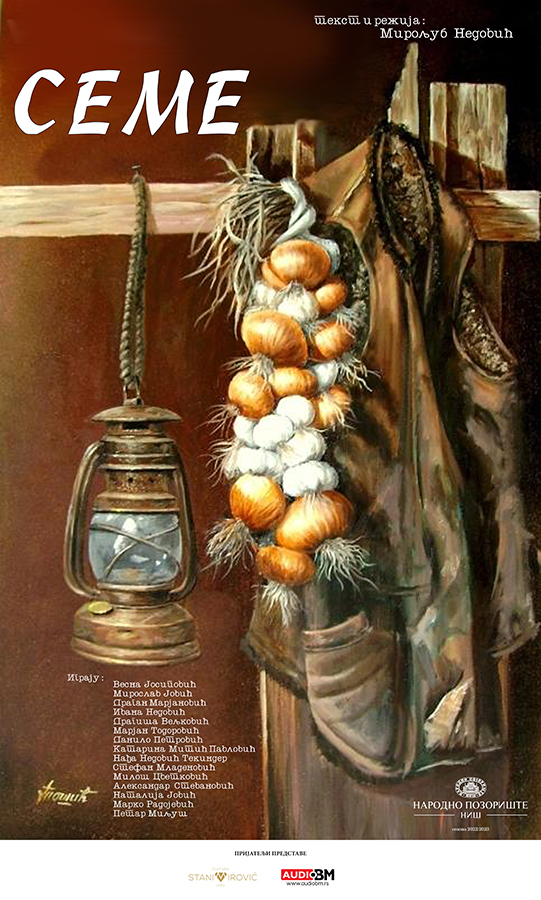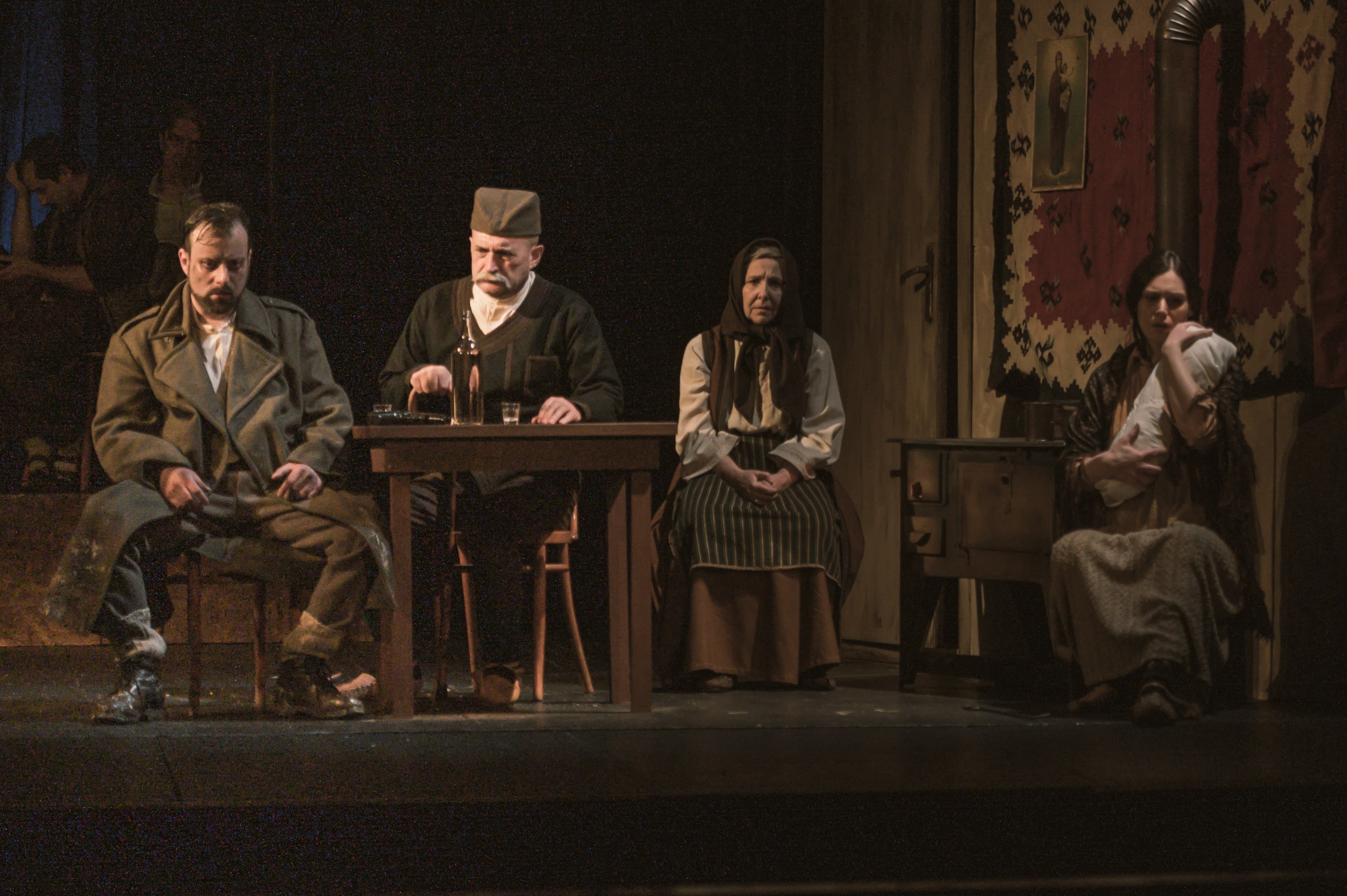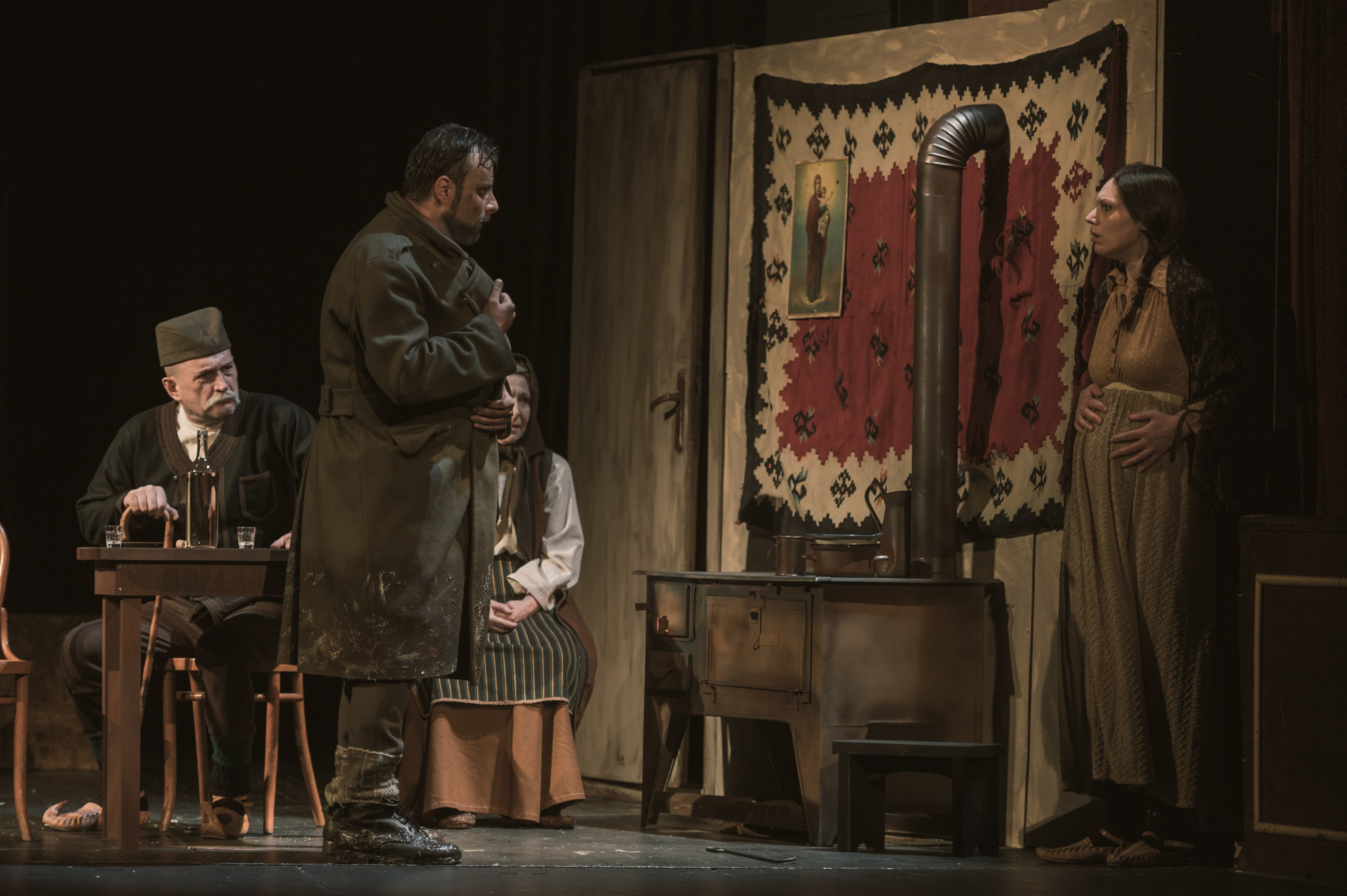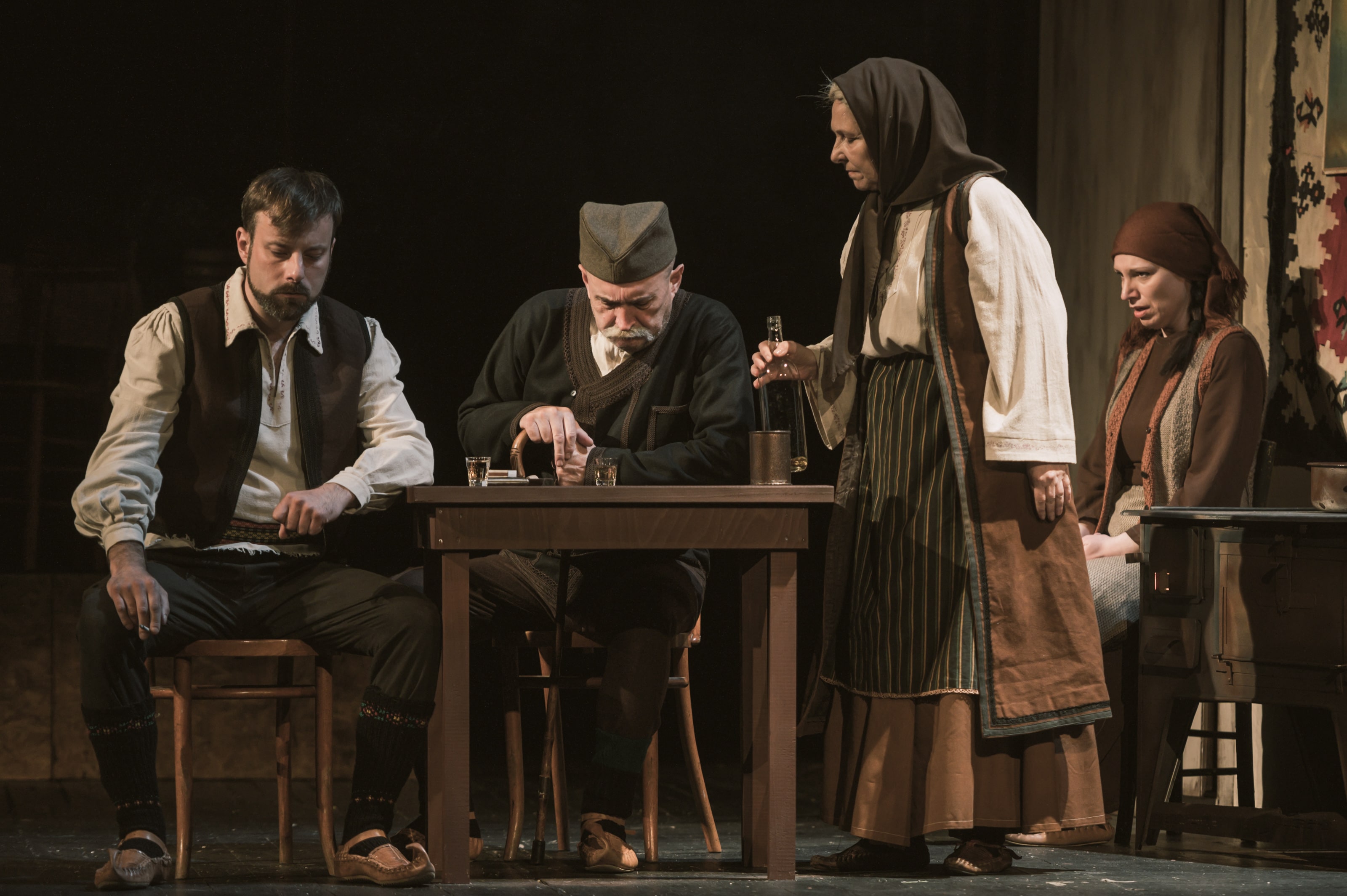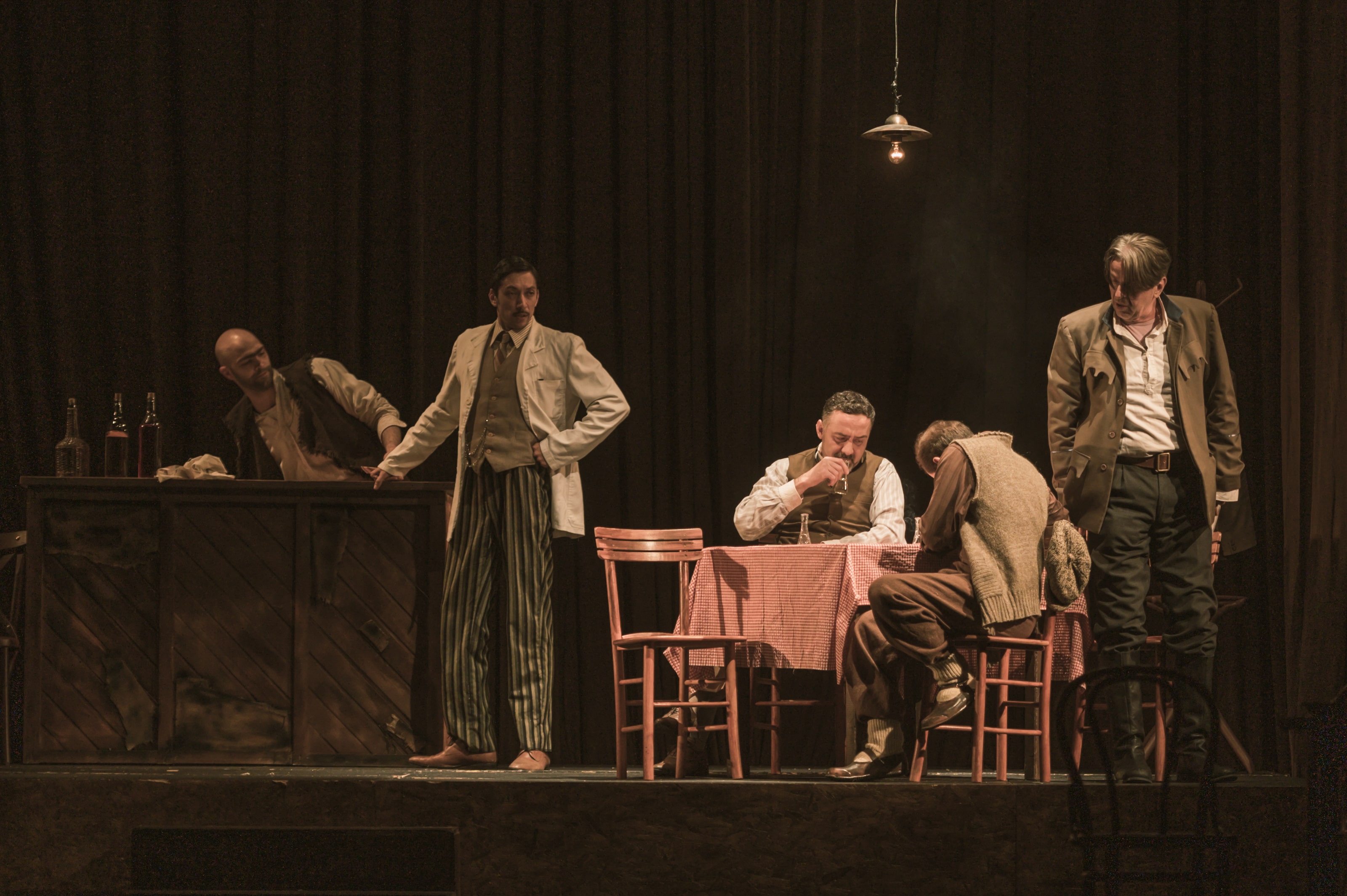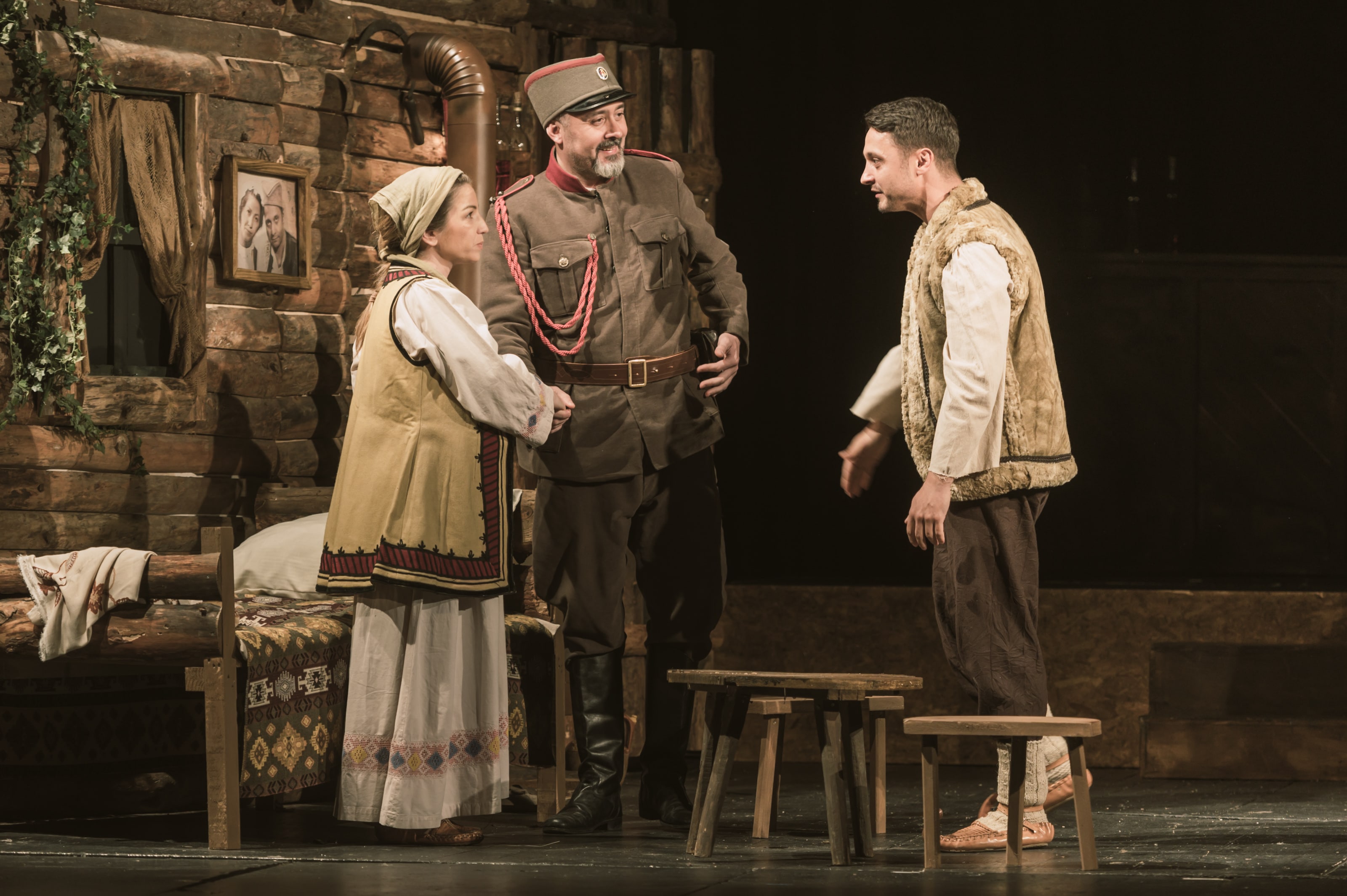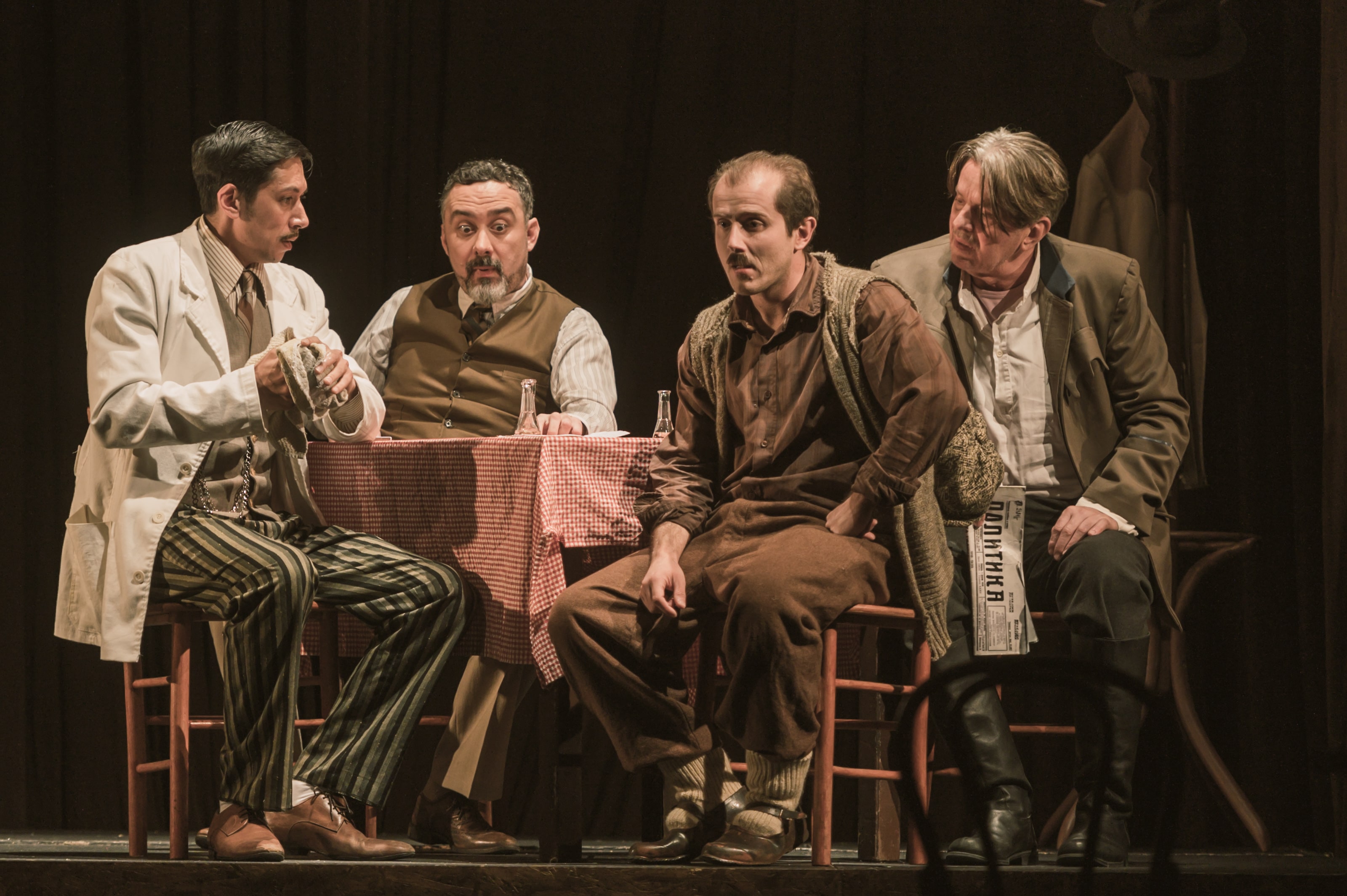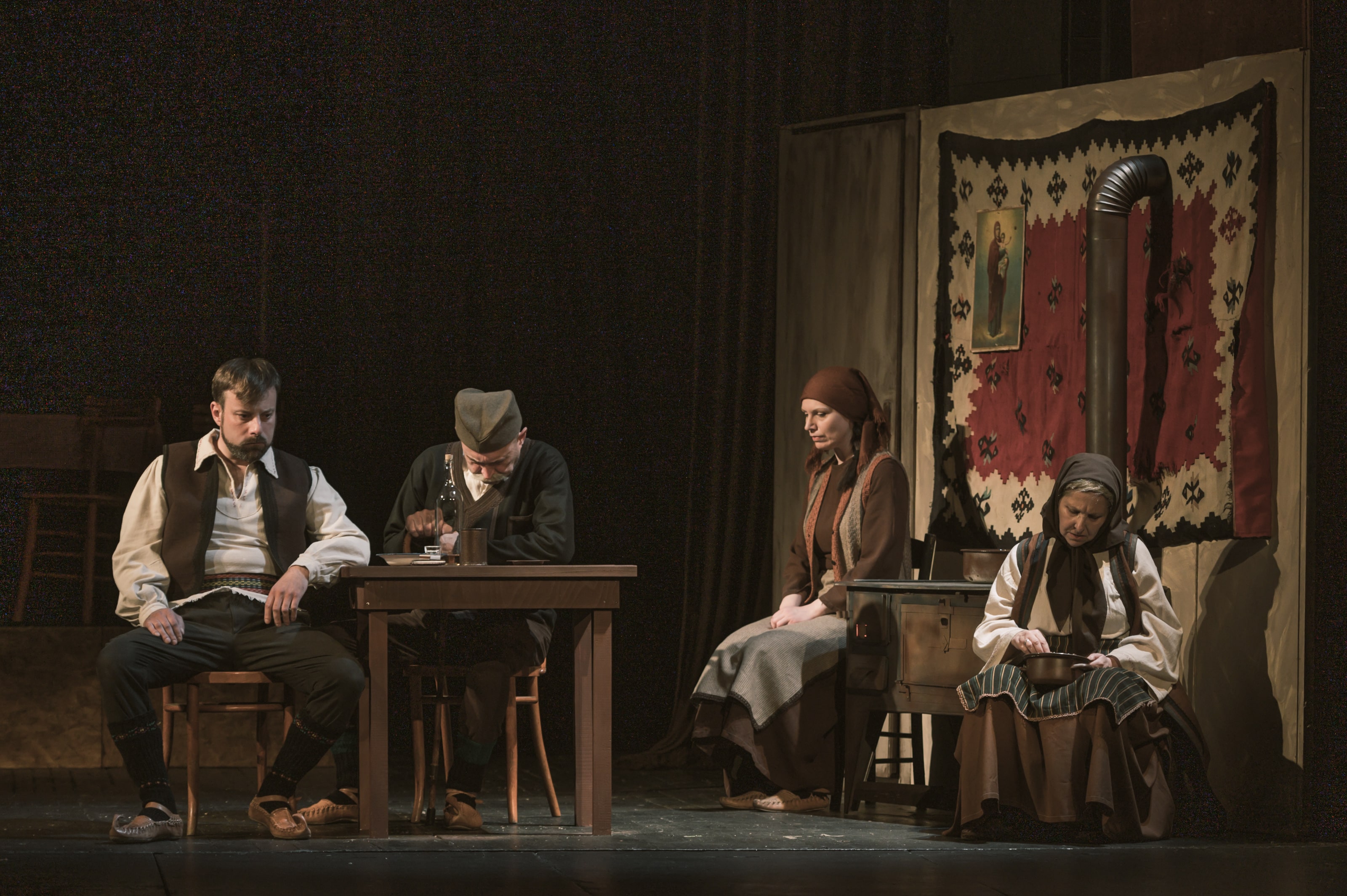
THE SEED
40 YEARS OF ARTISTIC WORK of Miroljub Riki Nedović
BIOGRAPHY OF THE WRITER / DIRECTOR
Miroljub Nedović Riki was Born in 1961 (horoscope sign – Aries) in Niš (hero city at the crossroads).
He completed his military service on time.
Never judged (by the court of this world… but by God and humans probably).
He was not, nor is he, a member of any political party.
He has membership cards of: Scouts’ Association, Dramatic Artists’ Association, Playwrights’ Association and Fishermen’s Association.
He makes other alliances only with himself and his family.
Assets – more than modest.
Co-owner of a used car, two female children and an actress wife.
Actor by birth, playwright by choice, director by conviction.
Actor of the Niš National Theater since 1983 (40 years).
Played over a hundred roles. Winner of several peaceful honors and awards.
As a playwright, he wrote about thirty plays, most of which were awarded at festivals and competitions.
Treason, as a concept, is very hateful to him, and yet, he has published several books so far.
As a director, he directed mostly what he wrote himself.
Artistic director of the stage of the “Third Half” theater – Niš.
Participant in the 1999 war.
Books: the Seed, Several Light Pieces, Niš–Nišlije–Niški, Abe Nišlije 1 and 2.
Anthologies: National Theater Writers, Contemporary Serbian Drama, Niš Playwrights.
Texts: (dramas) the Seed, Dark Vilayet, Tales from the World;
(monodramas) Come on, tell what’s on your chest, Wake up, Dead knot;
(comedies) Halk calling Eagle, Blues Smile, The Devil’s Work, Once Upon a Time in the Theater, Niš Kabariška, Rushing into the Future, Beaten and Mercenaries, Europeans, Asylants, Gangsterworkers, 1, 2, 3, 4, Tales from the World, Made in Niš , Wi Fi, Dolce Vita;
(plays for children) Kraljević Marko and Musa Kesedžija, Home Alone, The Great Prince, A Story from the Rainforest;
(dramatizations) How to Kill Your Wife, Children from the Zoo Station, Women’s Cabaret, Vojvoda Mišić, Bandits, Children’s Cabaret.
His texts were performed in Serbia (Niš, Belgrade, Novi Sad, Zajačar, Vršac, Vranje, Lebane, Ražanj, Paraćin, Trstenik, Aleksinac, Kragujevac, Leskovac, Sokobanja, Dimitrovgrad, Jagodina, Despotovac, Veliko Gradište, Kikinda, Sombor, Senta ), Macedonia (Bitolj, Sveti Stefan), Croatia (Virije, Vukovar, Osijek, Hvar, Sinj), Bosnia and Herzegovina (Banjaluka, Travnik, Novi Grad, Srebrenica, Kozarska Dubica, Bugojno, Tuzla, Zenica, Jajce, Prijedor, Tešanj), as well as in distant countries – Toronto (Canada), Neunhof (Switzerland), Chicago (USA).
A WORD FROM THE WRITER / DIRECTOR
The text the Seed was written more than thirty years ago and is a legacy of several awards: Ben Akiba, Association of Dramatists of Serbia, Joakim Vujić, from the Festival of Professional Theaters of Serbia, award at the festival in Knin (the last festival before the fall of Knin).
I am particularly proud of the fact that this text was performed in Banja Luka as the first play after the establishment of the Banja Luka Theater as the National Theater of the Serbian Republic.
So far, two plays have been performed on the stage of the National Theater in Niš: the drama Dark vilayet directed by Dejan Krstović in the 111th season of the theater and the cabaret Machoism, which I directed myself.
The Niš audience mostly knows me as a comedian, through the pieces that were played on the stage of “Off Theater” and “Third Half” with great success.
I am glad that I got the opportunity (honor and pleasure) to tell another story. Dramatic… poetic… emotional.
At the same time, I would like to take this opportunity to thank all those with whom I collaborated on the staging of this piece, which I hope you will like.
Welcome! Enjoy watching!
INTERVIEW WITH MIROLJUB RIKI NEDOVIĆ
ON THE OCCASION OF 40 YEARS OF ARTISTIC WORK
One of the important personalities of Niš, and certainly one of the patrons of the Niš National Theater, a man who has left a deep mark in this city with his work over the years and a man who managed to highlight Niš on the cultural map of Serbia – we are talking about Miroljub Riki Nedović – “an actor by birth, a playwright by choice, and a director by conviction”, but also the author of several novels and anthologies, who has been delighting the audience on the stage of the Niš National Theater for 40 years – since 1983.
He started his acting career in 1979 in the Youth Theater “Third Half”, under the direction of Desimir Stanojević. Today, he is the artistic director of the Off Theater “Third Half” venue in Niš, which consists of the “Third Half” youth stage and the “Off Theater” professional stage.
He has played more than a hundred roles and is the recipient of many recognitions and awards. As a playwright, he wrote about thirty plays, most of which won awards at festivals and competitions.
The first play by Riki that was performed at the National Theater in Niš was Dark Vilayet, directed by Dejan Krstović, in 1998 on the 111th anniversary of the Niš Theatre. This drama is also in the first volume of the printed edition “Contemporary Serbian Drama” from 1998. Another play that was included in the theater’s repertoire is Machoism, which premiered in December 2011.
The National Theater in Niš also staged his third drama, the Seed which he also directed. This text was written more than thirty years ago and has so far been awarded 3 times for the best dramatic text – at the festival in Knin, performed by the Banja Luka National Theater, at the “Joakim Vujić” festival, performed by the Timok Region Theater “Zoran Radmilović” from Zaječar and at competition of the Association of Playwrights of Serbia (“Ben Akiba” award).
In the interview, we talk about this play, but also about Ricky’s experiences, long-term work and his contributions in the field of culture. What the 40 years of Riki Nedović’s career records, read below.
Considering that you are an actor by birth, can you remember the most important role in the period before you joined the Youth Theater “Third Half” in 1979, and later the National Theater of Niš in 1983?
My first, not only the main role but the role in general, was in a musical on the stage of the Youth Theater “The Third Half” Love Call by Marko Mrča (role: Marko, text: Timošenko Milosavljević, director: Desimir Stanojević). It is interesting that the then rock group Top, later renamed Kerber, played in the performance.
Given that I joined the National Theater as a kid, at the age of 21, in the first years I mostly played children, so I played almost all the kids in our dramaturgy – Raka in the Minister’s Wife, Pote and Kote in Zona Zamfirova, Mitanča in Ivko’s Celebration … And I really had trouble “getting out” of the short pants.
When we talk about all those theater roles that have marked the many years of your work, which one would you single out as the most significant, and which one as your favorite?
After more than a hundred roles, it is difficult to say which was the favorite. Some roles I liked more, some less, some were more successful, some less successful. There were roles that I had to play, and there were roles that I wanted and didn’t get. But it’s all part of the game you agreed to play when you decided to get into this business.
Are there any shows you directed that you particularly like and why?
I directed about thirty shows, mostly what I wrote myself. Unlike acting, where I also played something I didn’t like, I only directed what I had the “craving” for. And all those plays were especially dear and significant to me at that moment.
For 40 years you have been creating, imagining and dreaming on the boards of the National Theater in Niš. Do you fondly remember an event in this house or perhaps an anecdote?
A lot of anecdotes, events, situations, experiences… For a whole novel or memoir. But I’m not ready to put it in the cover it yet. Will I ever? I don’t know… I wouldn’t swear that I will, or that I won’t either… We’ll see.
Can we go back to 1998, to the anniversary of the National Theater of Niš, when your text “Dark vilayet”, in which you played Šeki, was performed for the first time in this theater. How did you feel then and was this premiere a tailwind for further work?
Until then, some other theaters had already performed my texts extensively. It meant a lot to me that my house puts my piece in the repertoire. But the most important thing for me was the learning… Since then, I have not acted in plays based on my own texts directed by someone else. When others direct, I as a writer come to the premiere, I am more or less satisfied, but I don’t act, I don’t participate in the work process. If I participate, then I direct myself.
The show “the Seed”, based on your text and directed by you, marks 40 years of your artistic work at the Niš National Theater. Why did you choose to stage this particular piece?
I have several plays “in stock” that could equally be put on the stage of the National Theater. This text was chosen by the theater management. I assume because of its “pedigree”, i.e. more awards, which you already listed in the introduction.
How was the text “the Seed” created? Is there a specific situation or event that served as inspiration for this drama?
Nothing, not even close. And I really can’t explain how, why, when I get an idea for a piece. I have a reasonable doubt that I have some devil or angel, as it were, who whispers to me, and I just write it down.
What are the key themes that you deal with in this text about the lives of ordinary people, who live in a rural environment, and what can the audience expect after watching the play “the Seed”?
I expect them to like the show. I expect a standing ovation for the actors at the end. I expect the audience to be full of impressions. I expect full house, sold out shows. A lot of expectations for just one theater performance. But those who do not have expectations should not engage in theater.
The audience also knows you very well as a comedian, through your pieces such as “Asylums”, “Sexual Education”, “Made in Niš”, “Wi fi”, which were performed on the stage of “Off Theater” with great success. Which of the comedies would you single out as the one that was (or still is) an absolute hit?
The piece that is currently in the repertoire always stands out, which is Wi Fi, a comedy.
And the one that is right in front of the audience – the Seeed, drama.
When we talk about comedies, your cabaret shows like “Niška kabariška” or “Joke cabaret” were especially popular with the audience. Can you tell us a bit more about the process of working in cabaret compared to classical drama?
And Machoism was a cabaret. Cabaret is a specific stage form, with a wide range. I like to play in a cabaret. You are there with the audience at per tu; no fourth wall, looking into each other’s eyes, direct contact, no lies, no deception.
How did you manage to maintain a continuous career in the theater and what motivates you to continue doing this work?
Unfortunately, an actor in the theater can have little influence on his career. Someone else chooses texts, directors, makes divisions… It’s up to you to wait for the role to “stab” you. If you get a good task, to play it with all your strength, to the best of your ability and your knowledge, without pretending.
Even as a young actor I was not ready to wait. That’s why I founded the “Off Theater” scene. I wrote, directed, produced, and acted myself… It turned out well. Both myself and the audience are satisfied. Full cap, what else could you ask for?
Your advice to young artists who would like to work at the theater?
Exactly what I said in the previous answer – don’t wait! Make your own theater. Theater requires one actor on stage and one spectator in the audience. Everything else is an extension.
Author: Stanislava Petrović

Cast
Dobrivoje, unsuspecting warrior - Danilo Petrović
Strawberry, his wife - Katarina Mitić Pavlović
Father, his father - Miroslav Jović/ Dragan Boža Marjanović
Mother, his mother - Ivana Nedović
Nikola, the unsuspecting gendarme - Stefan Mladenović
Milica, his wife - Nađa Nedović Tekinder
A handsome man, a gambler and an unsuspecting gendarme - Marjan Todorović
Captain, former infantry officer - Dragiša Veljković
The Barber - Miloš Cvetković
Prpa, wage earner, does anything and everything - Aleksandar Stevanović
The Fortune Teller - Vesna Josipović
Jelena, Sava's unsuspecting wife - Natalija Jović
Happy, unsuspecting warrior - Marko Radojević
The Waiter - Petar Miljuš
Technical Crew
Technical director: Dejan Mitić
Sound design: Slobodan Ilić
Lighting design: Dejan Cvetković
Light operator: David Jovanović
Stage master: Slaviša Filipović
Stage dressers: Marin Rajić, Miodrag Đorđević, Srđan Kitanović and Mića Lazarević
Props coordinator: Nemanja Perić
Wardrobe: Dušica Mladenović and Katarina Pavlović
Make-up artists, hairdressers: Ljiljana Rašić, Marija Cvetanović and Ivana Lazarević
Tailoring works: Marina Stevanović and Vladimir Pekić
Workshop: Aleksandar Rajić, Branislav Nikolić, Dragan Perić and Goran Stanković
Procurement: Zoran Denčić and Ivan Todorović
Driver: Nebojsa Šarčević

 srpski
srpski English
English
